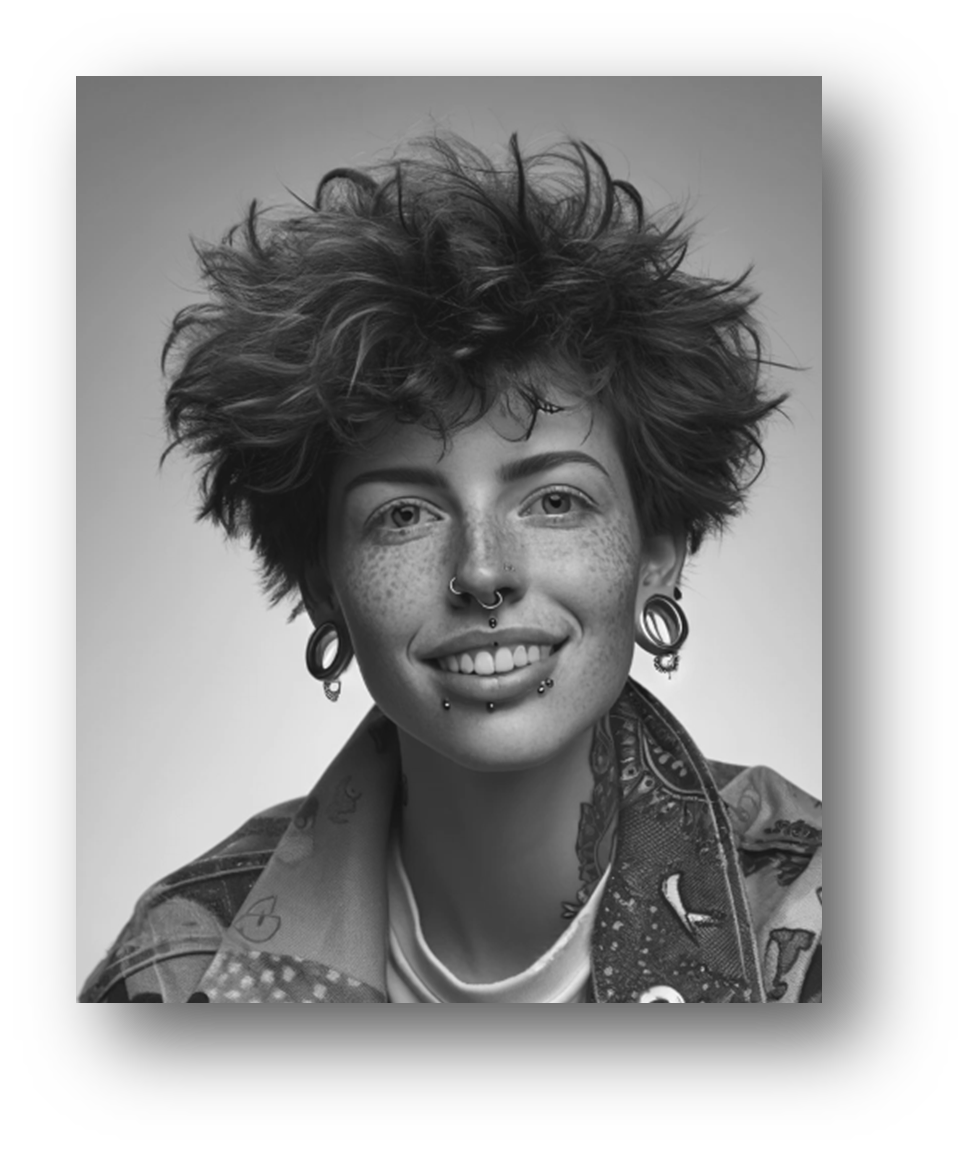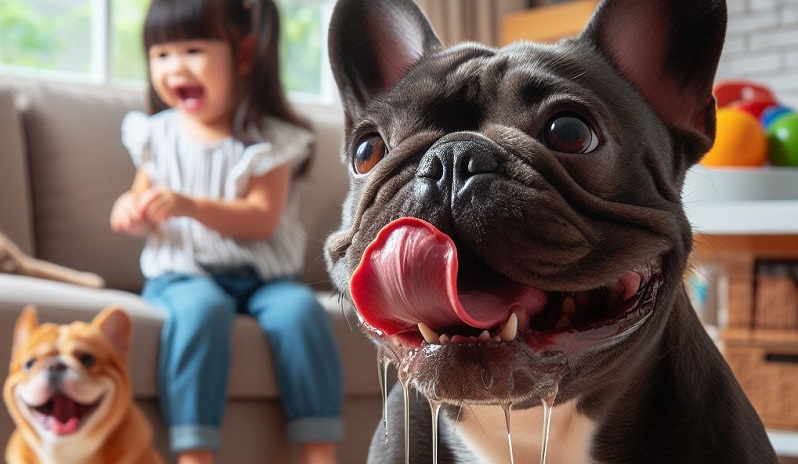Understanding Drooling in French Bulldogs
Drooling, or salivation, is a natural process in dogs. It serves several key functions, including aiding digestion and keeping the mouth lubricated.

Written By
Dan Harrison
Editor

Co-Written By
David Anderson
Writer

Reviewed By
Penny Worthington
Health

Research By
Sammi Slater
Researcher
Page Last Updated: 8th May 2024
On this page
Quickly find and read what interests you the most using the links below:
Table of contents:
Why Do French Bulldogs Drool?
Normal Drooling and Its Functions
Drooling, scientifically known as ptyalism, is the act of saliva flowing outside the mouth.
This natural process serves several crucial functions in dogs, including French Bulldogs.
Here’s a more detailed look:
- Digestive Preparation: Saliva contains enzymes that start the breakdown of food even before it reaches the stomach. The anticipation of food triggers the salivary glands to produce more saliva, effectively preparing the digestive system for the incoming food.
- Oral Health: Saliva helps cleanse the mouth by washing away food particles and bacteria, reducing the risk of dental diseases. It also acts as a lubricant that helps protect the oral mucosa (the mucous membrane lining the mouth) from damage during eating.
- Temperature Regulation: For some dogs, drooling can also help them cool down, especially in hot weather, though this is more common in dogs with more extensive jowls.
Specific Reasons for French Bulldogs
French Bulldogs are brachycephalic breeds, which means they have a broad, short skull shape. This distinctive facial structure contributes to several specific reasons for their drooling:
- Brachycephalic Facial Structure: The shortened bones in French bulldogs’ faces can lead to misalignment or insufficient mouth closing. This structural peculiarity can make it difficult for French Bulldogs to retain all the saliva inside their mouth, leading to more noticeable drooling.
- Inefficient Swallowing: French bulldogs’ short snout and compacted anatomy of the throat and airways can impact the efficiency of their swallowing mechanism. When swallowing becomes less efficient, it can result in an increase in saliva spillage outside the mouth.
- Dental Issues: Due to their condensed cranial structure, brachycephalic dogs often have crowded teeth or misaligned jaws, which can lead to dental and gum diseases that stimulate excessive saliva production.
- Heat Dissipation: Although less effective than in breeds with larger jowls, the evaporation of saliva can also help brachycephalic breeds like French Bulldogs dissipate heat and cool down, particularly after physical exertion or in warm environments.
While drooling is a normal physiological response with essential functions in dogs, including French Bulldogs, the peculiarities of the French Bulldog’s anatomy amplify this characteristic.
Their brachycephalic facial structure gives them their unique and adorable appearance and leads to more pronounced drooling due to difficulties in mouth closure and swallowing efficiency.
Normal vs Excessive Drooling
Normal Drooling Patterns
Normal drooling in French Bulldogs, as with other dogs, is a common occurrence that serves various physiological purposes, including aiding digestion and maintaining oral health.
Here are some critical points about normal drooling:
- Response to Stimuli: It’s normal for French Bulldogs to drool in anticipation of food, during meals, or when smelling something particularly appetising. This drooling is a reflex action in response to the excitement or the prospect of eating.
- After Drinking Water: It’s also common for these dogs to drool more noticeably right after drinking water. Their unique facial structure may make keeping all the water inside their mouth difficult, leading to some drooling.
- During Play or Excitement: Excitement, whether due to play, greeting family members, or seeing other dogs, can also trigger increased saliva production.
This drooling type is typical and usually doesn’t indicate a health problem.
It’s sporadic and directly related to specific stimuli.
Indicators of Excessive Drooling
While some drooling is expected, excessive or hypersalivation is characterised by increased saliva production beyond the dog’s normal response to stimuli and could indicate health issues.
Key indicators include:
- Continuous Drooling: Your French Bulldog drools excessively without any apparent trigger (like food or excitement) could indicate an underlying issue.
- Change in Drooling Pattern: A sudden increase in drooling, especially if it’s continuous or accompanied by other symptoms, warrants closer attention.
- Accompanying Symptoms: Excessive drooling coupled with other signs such as lethargy, vomiting, difficulty eating or swallowing, or signs of pain (whining, discomfort when touching the mouth) can indicate dental issues, gastrointestinal problems, or other health concerns.
Potential Causes of Excessive Drooling
Several health issues can lead to excessive drooling in French Bulldogs, including:
- Dental Problems: Dental disease, tooth abscesses, or gum disease can cause pain and increase saliva production.
- Gastrointestinal Issues: Conditions like esophagitis, foreign bodies stuck in the mouth or throat, or nausea can trigger excessive drooling.
- Heatstroke: Brachycephalic breeds are prone to overheating, which can cause drooling as the body cools down.
- Toxin Exposure: Contact with toxic substances or plants can increase drooling as the body tries to rid itself of the toxin.
- Neurological Disorders: Issues affecting the nervous system can also manifest through excessive drooling.
While drooling is a natural and often harmless phenomenon related to their unique physiology and responses to certain stimuli, excessive or abnormal drooling could signal health problems requiring veterinary care.
Recognising these signs early and consulting with a veterinarian can ensure that any underlying issues are addressed promptly, keeping your French Bulldog healthy and happy.
Health Concerns Associated with Excessive Drooling
Neurological Disorders
Neurological disorders affect the body’s brain, spinal cord, and nerves.
In dogs, such conditions can interfere with the normal functioning of the nervous system, potentially affecting the control of saliva production.
Examples include:
- Rabies: A viral disease that affects the brain and is usually fatal once symptoms appear; rabies can cause excessive drooling as the virus affects the nervous system.
- Distemper: Another viral disease that can lead to increased drooling due to its impact on the nervous system.
- Seizure Disorders: Conditions that cause seizures, such as epilepsy, can also lead to temporary periods of excessive drooling.
Organ Diseases
Diseases affecting major organs like the liver or kidneys can lead to excessive drooling in dogs for several reasons:
- Liver Disease: The liver plays a crucial role in detoxifying the body. When it’s not functioning correctly, toxins can build up, potentially leading to nausea or a feeling of illness in dogs, which can cause increased saliva production.
- Kidney Disease: Like liver disease, kidney disease affects the body’s ability to eliminate waste. This can lead to a buildup of toxins in the blood, resulting in nausea and increased drooling.
Infections
Various infections can also cause a dog to drool excessively.
These can include:
- Dental Infections: Infections in the teeth or gums can be excruciating and may lead to increased drooling. Such infections often require immediate veterinary care to prevent spread to other body areas.
- Stomatitis: This is an inflammation of the mouth that can cause significant pain and drooling. Several factors, including infections, autoimmune diseases, or allergies, can cause it.
- Systemic Infections: Illnesses that affect the body globally, such as sepsis, can lead to excessive drooling as part of their symptomatology.
Why It’s a Concern
Excessive drooling, mainly when it occurs suddenly and without an apparent cause, is concerning for several reasons:
- It can indicate a serious underlying health issue that requires immediate attention.
- The underlying cause may be painful or uncomfortable for the dog, impacting their quality of life.
- Some conditions that cause excessive drooling are contagious to other pets or even humans, as in the case of rabies.
If a dog, particularly a French Bulldog, begins to drool excessively without an apparent reason, it’s essential to seek veterinary care promptly.
Early detection and treatment of the underlying cause can prevent more severe outcomes and ensure the pet’s health and well-being.
When to Seek Veterinary Care
When monitoring the health and well-being of a French Bulldog or any breed, understanding when to seek veterinary care, especially about changes in drooling patterns, is vital.
Excessive drooling can be a symptom of various underlying health issues, some requiring immediate attention.
Here’s a more detailed look at when to consult with a veterinarian.
First, it’s essential to establish a baseline of what’s normal for your dog. Since French Bulldogs are prone to drooling due to their brachycephalic nature, slight increases related to excitement or hunger are typically normal.
However, any abrupt changes in the drool’s amount, consistency, or colour can be concerning.
Symptoms Accompanying Excessive Drooling
Specific symptoms, when observed alongside excessive drooling, indicate the need for immediate veterinary attention:
- Difficulty Breathing: If your dog has trouble breathing, which can manifest as heavy panting, wheezing, or gasping, it’s a sign of a possible emergency. Respiratory issues can quickly become life-threatening, particularly in brachycephalic breeds.
- Vomiting or Diarrhoea: These symptoms, if persistent, can lead to dehydration and indicate gastrointestinal issues or toxicity. If accompanied by excessive drooling, it suggests that the situation is urgent.
- Lethargy: A sudden lack of energy or unwillingness to move or engage can indicate various severe conditions. When combined with excessive drooling, it signals something is wrong.
- Suspected Poisoning: If there’s any suspicion that your dog has ingested something toxic, immediate veterinary care is crucial. Signs of poisoning can include excessive drooling, vomiting, seizures, and lethargy.
- Ingestion of Foreign Objects: Dogs are curious and sometimes ingest non-food items, which can cause gastrointestinal blockage or injury. Symptoms may include drooling more than usual, along with distress, gagging, or attempting to vomit.
Diagnosis and Treatment
Diagnosis of Excessive Drooling
When a French Bulldog presents with excessive drooling, veterinarians follow a structured approach to diagnosis, which may include:
- Comprehensive History: This initial step involves understanding the onset, duration, and any potential triggers of the drooling. The vet may ask about recent activities, exposure to toxins, diet changes, or foreign object ingestion.
- Physical Examination: A thorough physical exam can reveal signs of dental disease, swelling, or pain that could indicate the source of the problem. The vet will pay special attention to the oral cavity and assess the dog’s health.
- Oral Examination: A more focused examination of the mouth, under sedation, if necessary, helps identify dental diseases, tumours, or foreign objects lodged in the gums or between teeth.
- Blood Tests: Blood work is crucial to assess the dog’s overall health and can reveal signs of infection, organ dysfunction (such as liver or kidney disease), or other systemic issues that might lead to excessive drooling.
- Imaging: X-rays, ultrasounds, or even CT scans can be instrumental in diagnosing issues not visible through physical examination alone. These can reveal foreign bodies, tumours, or structural abnormalities in the throat, neck, or chest.
Treatment of Excessive Drooling
The treatment for excessive drooling depends on the underlying cause identified during the diagnostic process:
- Foreign Objects: If the drooling is caused by an object lodged in the mouth or throat, immediate removal of the object is necessary, sometimes requiring surgery.
- Dental Diseases: Treatment may include professional dental cleaning, tooth extraction, or gum disease treatment. Maintaining dental health through regular brushing and dental chews can help prevent future issues.
- Infections: Bacterial infections can be treated with antibiotics, whereas viral infections will require supportive care and, depending on the virus, specific antiviral medications.
- Organ Diseases: Diseases of the liver, kidneys, or other organs may require long-term management through diet, medications, and in some cases, surgery. The treatment aims to manage the disease and alleviate symptoms.
- Toxin Exposure: Treatment involves removing toxins from the body and providing supportive care to alleviate symptoms. This may include administering activated charcoal, IV fluids, or specific antidotes if available.
- Heatstroke: Immediate cooling and veterinary care are critical. Treatment may involve cooling measures, hydration, and monitoring for organ damage.
Follow-Up Care
After the initial treatment, follow-up care is crucial to ensure the French Bulldog is recovering well and to adjust treatment as needed.
This may involve additional vet visits, medication changes, or dietary adjustments.
Monitoring the dog’s drooling and overall health at home is also essential to gauge recovery progress.
Follow-up care plays a crucial role in recovery, highlighting the importance of ongoing monitoring and veterinary support.
Managing Drooling in French Bulldogs
This approach helps to keep your French Bulldog comfortable and can prevent the development of more severe conditions related to excessive drooling.
Here’s a look into managing excessive drooling and every day in French bulldogs.
Everyday Drooling Management
- Oral Hygiene: Regular dental care is paramount. This includes brushing your French Bulldog’s teeth daily with canine-specific toothpaste and scheduling professional dental cleanings as your vet recommends. Healthy teeth and gums can significantly reduce drooling caused by oral health issues.
- Comfortable Environment: Because French Bulldogs are brachycephalic and prone to overheating, keeping them in a cool, well-ventilated environment can help manage drooling related to heat stress. Always provide access to fresh water and shade and avoid excessive exercise in hot weather.
- Proper Diet: Feeding your French Bulldog a balanced diet that is easy to chew and digest can help manage drooling. Some foods may stimulate saliva production more than others, so monitoring and adjusting their diet accordingly can be beneficial.
- Regular Vet Check-ups: Routine health checks can help identify and address potential health issues that may cause excessive drooling before they become serious.
Managing Excessive Drooling
When excessive drooling is observed, it’s essential to identify and treat the underlying cause while providing supportive care:
- Veterinary Diagnosis and Treatment: A visit to the vet is essential if your French Bulldog starts drooling excessively without an obvious reason. As discussed previously, the vet may perform various tests to diagnose the cause, which will dictate the treatment plan. This could range from removing foreign objects and treating infections to managing chronic conditions like liver or kidney disease.
- Ensuring Hydration: Excessive drooling can lead to dehydration, so make sure your dog has continuous access to clean water. Under veterinary guidance, intravenous or subcutaneous fluids may be necessary in cases of illness or heatstroke.
- Maintaining Cleanliness: Excessive drooling can lead to skin irritation around the mouth, chin, and neck. Regularly cleaning these areas with a soft, damp cloth can prevent irritation and infection.
- Supportive Care: Depending on the cause of excessive drooling, supportive care may include administering medications as your veterinarian prescribes, dietary adjustments, or using cooling mats to prevent overheating in susceptible breeds.
- Monitoring: Monitoring your French Bulldog’s symptoms and behaviour is crucial during treatment. Any changes that may indicate the need for treatment adjustments should be reported to your veterinarian.
Managing drooling in French bulldogs requires an approach that includes preventative measures and direct intervention when excessive drooling is observed.
Maintaining oral hygiene, providing a comfortable and cool environment, ensuring proper nutrition, and regular veterinary care are critical components of everyday management.
When faced with excessive drooling, prompt veterinary diagnosis and treatment, alongside supportive care measures, are essential to address the underlying cause and maintain the health and comfort of your French Bulldog.
Final thoughts
Understanding drooling in French Bulldogs is vital for recognising when it’s a sign of underlying health issues.
Monitoring drooling patterns and maintaining open communication with your veterinarian can help keep your French Bulldog healthy and comfortable.
Frequently Asked Questions (FAQs)
How can I tell if my French Bulldog’s drooling is excessive?
Compare the dog’s current drooling to its normal behaviour. Increases in drooling accompanied by other symptoms or without an apparent cause should be evaluated by a vet.
What should I do if my French Bulldog starts drooling excessively?
Assess for any immediate dangers (like heatstroke or foreign objects) and consult your veterinarian immediately.
Can drooling be prevented?
While normal drooling is natural, preventing excessive drooling involves regular health and dental care and managing environmental factors to reduce the risks of overheating and stress.
Albino (Pink)
Black and Tan
Blue
Brindle
Chocolate
DNA Charts
Fawn
Fluffy
Hairless
Isabella
Lilac
Merle
Pied
Platinum
Sable
Teacup
Dry Dog Food
Fresh Dog Food
Gastrointestinal Dog Food
Grain-Free Dog Food
Hypoallergenic Dog Food
Low-Fat Dog Food
Organic Dog Food
Raw Dog Food
Wet Dog Food
Recipes
Dog Treats
Vitamins and Supplements
Grooming
Health & Wellbeing

Terms of Use
Privacy Policy
GDPR Policy
Transparency Policy

